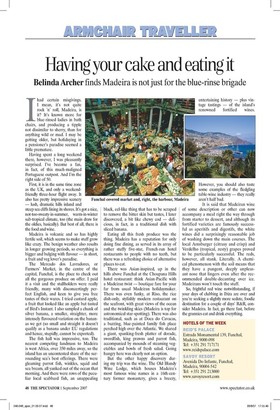Having your cake and eating it
Belinda Archer finds Madeira is not just for the blue-rinse brigade Ihad certain misgivings. I mean, it's not quite rock 'n' roll, Madeira, is it? It's known more for blue-rinsed ladies in bath chairs, and producing a tipple not dissimilar to sherry, than for anything wild or mad. I may be getting older, but holidaying in a pensioner's paradise seemed a little premature.
Having spent a long weekend there, however, I was pleasantly surprised. I've become a fan, in fact, of this much-maligned Portuguese outpost. And I'm the right side of 50.
First, it is in the same time zone as the UK, and only a weekendfriendly three-hour flight away. It also has pretty impressive scenery — lush, dramatic hills inland and steep sea cliffs lining its shores. It's got a nice, not-too-sweaty-in-summer, warm-in-winter sub-tropical climate, too (the main draw for the oldies, basically). But best of all, there is the food and wine.
Madeira is volcanic and so has highly fertile soil, which seems to make stuff grow like crazy. The benign weather also results in longer growing periods, so everything is bigger and bulging with flavour — in short, a fruit and veg lover's paradise.
The Mercado dos Lavradores, or Farmers' Market, in the centre of the capital, Funchal, is the place to check out all the gorgeous produce on offer. I paid it a visit and the stallholders were really friendly, many with disconcertingly perfect English, and keen to give you free tastes of their wares. I tried custard apple, a fruit that looked like an apple but tasted of Bird's Instant. I also sampled a chunk of silver banana, a smaller, straighter, more intensely flavoured variation on the bananas we get (so small and straight it doesn't qualify as a banana under EU regulations and hence, stupidly, cannot be exported).
The fish hall was impressive, too. The nearest competing landmass to Madeira is west Africa, over 350 miles away, so the island has an uncontested share of the surrounding sea's best offerings. There were gleaming parrot fish, winkles, squid and sea bream, all yanked out of the ocean that morning. And there were rows of the peculiar local scabbard fish, an unappealing black, eel-like thing that has to be scraped to remove the bitter skin but tastes, I later discovered, a bit like chewy cod — delicious, in fact, in a traditional dish with sliced banana.
Eating all this fresh produce was the thing. Madeira has a reputation for only doing fine dining, as served in its array of rather stuffy five-star, French-run hotel restaurants to people with no teeth, but there was a refreshing choice of alternative places to eat.
There was Asian-inspired, up in the hills above Funchal at the Choupana Hills hotel restaurant: think Asian-Pacific with a Madeiran twist — boutique fare for your far from usual Madeiran holidaymaker. There was even funky, at Riso, the rice dish-only, stylishly modern restaurant on the seafront, with great views of the ocean and the twinkling skies (Madeira is top for astronomical star-spotting). There was also traditional, such as at Doca do Cavacas, a buzzing, blue-painted family fish place perched high over the Atlantic. We shared a giant, spanking-fresh platter of dorade, swordfish, king prawns and parrot fish, accompanied by mounds of steaming vegetables and bowls of fresh salad. Going hungry here was clearly not an option.
But the other happy discovery during my trip was the wine. The Old Blandy Wine Lodge, which houses Madeira's most famous wine names in a 16th-century former monastery, gives a breezy, However, you should also taste some examples of the fledgling table-wine industry — they really aren't half bad.
It is said that Madeiran wine of some description or other can now accompany a meal right the way through from starter to dessert, and although its fortified varieties are famously successful as aperitifs and digestifs, the white wines did a surprisingly reasonable job of washing down the main courses. The local Arnsburger (citrusy and crisp) and Verdelho (tropical, zesty) grapes proved to be particularly successful. The reds, however, all stank. Literally. A chemical phenomenon with the soil means that they have a pungent, deeply unpleasant nose that lingers even after the recommended double-decanting over ice. Madeirans won't touch the stuff.
So, frightful red wine notwithstanding, if your days of clubbing in Ibiza are over and you're seeking a slightly more sedate, foodie destination for a couple of days' R&R, consider Madeira. In fact, go there fast, before the grannies eat and drink everything.







































 Previous page
Previous page